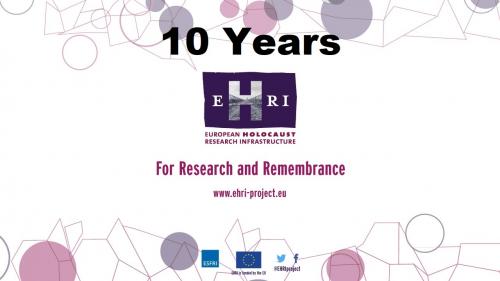10 years of EHRI

By EHRI Directors, Karel Berkhoff and Reto Speck
The first EHRI project was officially launched at a kick-off event in Brussels on 16 November 2010. This means it is EHRI’s 10th birthday this week, and we thought this would be a fitting occasion to reflect on the project’s results and achievements, to stress its continuing relevance and to look forward to its future.
Clear mission
Since EHRI’s beginning, we have followed a clear mission: to enable new transnational research on the Holocaust by overcoming dispersal and fragmentation of Holocaust archives and expertise across the globe. We have approached this mission by integrating the holdings and expertise of archives and research centres and by offering virtual and physical access through fellowships, online services and training programmes.
First and foremost, EHRI enables scholarly research on the Holocaust, but it also serves a wider social, cultural and political purpose. The Holocaust is a formative European experience, and an intrinsic part of our shared history and cultural heritage. Holocaust documentation, research and commemoration therefore have relevance far beyond the walls of academia. Central to EHRI’s mission is a recognition that the darkest chapter in European history must be reread and refined by each passing generation, so that it may serve as a warning and as a negative foil against which we can define ourselves.
Continued relevance
Our mission and wider impact are as relevant today as they were ten years ago. Safeguarding, integrating and enhancing access to Holocaust archives remain key challenges. This has been powerfully articulated in the 2020 Ministerial Declaration of the International Holocaust Research Alliance (IHRA). Issued on the occasion of the 75th anniversary of the liberation of Nazi concentration and extermination camps earlier this year, the declaration reaffirms the commitment of the member states to safeguarding the historical record of the Holocaust and other victims of Nazi Germany, and it underlines the ongoing importance of “identifying, preserving, and making available archival material, testimonies and authentic sites for educational purposes, commemoration and research.” EHRI is fully committed to this mission. In our view the troubling recent rise of xenophobia, racism, Antisemitism and narrow nationalisms demonstrate that understanding the mechanics and legacy of the Holocaust is never a purely academic concern, but a prerequisite for the further development of stable, open and non-discriminatory societies across Europe and beyond.
Great strides
EHRI has made great strides to approach its mission over the last decade. We have developed the EHRI Portal that gives information about dispersed Holocaust sources, as well as the Conny Kristel Fellowship Programme, the Document Blog, EHRI Editions, and an extensive training programme including an online course and seminars. We have developed a committed and growing community around our services, and EHRI is now an important landmark in the Holocaust archive and research landscape. However, we are not resting on our laurels. In September this year we have launched the ambitious EHRI-3 project which will further expand our existing services, develop new online and in-person activities, and establish connections to new communities and networks.
Permanent European Research Infrastructure for Holocaust research
EHRI’s success has been widely recognised, most prominently in 2018, when the European Strategy Forum on Research Infrastructure (ESFRI) placed EHRI on its Roadmap. The ESFRI Roadmap identifies research infrastructure initiatives that have high strategic importance for the future development of the European Research Area. Our placement on the ESFRI Roadmap enables us to transform EHRI from a series of projects into a permanent organisation in the context of the EHRI Preparatory Phase project which started last year. Although effecting such a transformation is challenging, we are confident that we can launch EHRI as a permanent European Research Infrastructure for Holocaust research in January 2025, the 80th anniversary of the liberation of the Auschwitz concentration camp.
Collective and pan-European effort
EHRI is a consortium of 25 partner institutions from across Europe, Israel and the United States. Its success is due to the effort and dedication of the staff working at our partners. As a truly collective and pan-European effort, EHRI shows what can be achieved when institutions and people pool expertise, perspectives and resources across geographical and disciplinary boundaries. Bringing together and supporting collaboration between so many Holocaust-related and digital humanities organisations has often been considered one of EHRI’s greatest achievements.
Conny Kristel
Despite the collective nature of EHRI, it would be remiss if we celebrated its 10th anniversary without mentioning Conny Kristel, (1955-2018), EHRI’s first director. Conny was the instigator, driving force and heart and soul of EHRI from its very beginning until her untimely death on 6 October 2018. By celebrating EHRI’s birthday today, and by making sure that it will continue to flourish in the future, we are also celebrating Conny’s memory and legacy.
A (virtual) glass
The coming months and years will be challenging. We will need to expand EHRI and secure its long-term future. The consortium’s commitment to both tasks is unwavering. We are therefore confident that we will be able to celebrate many more landmark birthdays in the future. For this anniversary we have received several encouraging statements from people that have been involved with EHRI in the past. This week, our work does not stop, but we raise a (virtual) glass in celebration of the joint achievements of the past decade.